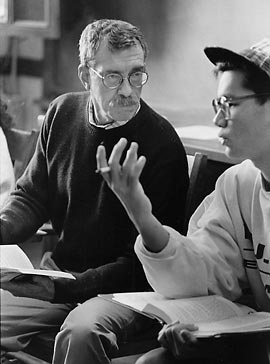Professor Emeritus Kenneth Weisinger dies at age 60 after battle with cancer
BERKELEY – Kenneth Dean Weisinger, director of the University of California, Berkeley, campus's Education Abroad Program and professor emeritus of German and comparative literature, died at his San Francisco home on Monday (July 28) after battling cancer for the past year. He was 60.
Weisinger, who had taught at UC Berkeley since 1970, was best known for his research on Weimar classicism and the German poets Johann Wolfgang von Goethe and Friedrich Hölderlin.
 Kenneth Dean Weisinger (Peg Skorpinski photo) |
His interests ranged from Goethe and the Brothers Grimm, Chinese opera and Italian cooking, to lyric poetry, fine chocolate and traveling. Weisinger was said to enjoy teaching students how to appreciate literary and musical forms that were new to them, such as classical Greek and German verse, German operas of the 18th and 19th centuries and the American musicals that were the basis of his course in the American Cultures program.
Weisinger "radiated cultivation, enjoyment, and cheerfulness," said Barbara Spackman, summer chair of the Department of Comparative Literature, who added that she was speaking on behalf of his colleagues there.
"His stunning erudition in classical philology, literature and music has been a great inspiration for me and many of us over the years," said Tony Kaes, chair of Berkeley's German department.
Although Weisinger retired from teaching in June, he had remained the acting director of UC Berkeley's Education Abroad Program (EAP), where he had been a strong advocate as its director since 1998. He twice served as chair of UC Berkeley's comparative literature department.
A Blanco, Texas native, he received his BA in history from Stanford University in 1964. During his time at Stanford, he became interested in German and the classics and participated in the university's overseas program in Beutelsbach, Germany.
At UC Berkeley, Weisinger earned his master's degree in 1967 in comparative literature and a PhD in comparative literature (Greek, Latin and German) in 1971. During his graduate training, he studied at both the Freie University in Berlin and the University of Tübingen.
He wrote his dissertation on Hölderlin's reading and refashioning of the Greek lyric poet Pindar, conducting much of his research in the Hölderlin Archives in Stuttgart, Germany.
His experience studying abroad as an undergraduate and graduate student helped form his appreciation of the importance of UC Berkeley's EAP, said Jan Kieling, assistant director of the program and Weisinger's longtime friend. With Weisinger at the helm, the number of students participating in the program grew substantially, a development that coincided with campus efforts to make greater use of EAP to help accommodate dramatically increasing undergraduate enrollment.
"He was very convincing (in his argument) that EAP was not an experience to be missed," Kieling said. "He really moved EAP into the curriculum in a way that no one had before. Ken had excellent rapport with other faculty, and he made a lot of friends for the EAP by being so thoughtful and gregarious. He was a wonderful advocate for study abroad on this campus."
Weisinger's book, "The Classical Façade: A Non-Classical Reading of Goethe's Criticism," was published in 1988 by Pennsylvania State University Press. He also was a reader and reviewer for many academic presses and journals.
At the time of his death, Weisinger was working on a book on Johann Christoph Friedrich von Schiller and another on the collaboration between German male authors during the 19th century, such as the Brothers Grimm, Clemens Brentano and Ludwig Achim von Arnim, and Goethe and Schiller. An essay on the last two, "Fathering the Canon: The correspondence between Goethe and Schiller," was published in 1996.
One former student, now a professor himself, said Weisinger made it all look easy.
"He was completely laid back and relaxed in the classroom," said Richard Serrano of New York City, who worked as a graduate student with Weisinger at UC Berkeley from 1990 to 1996 and is now a professor of French and comparative literature at Rutgers University in New Jersey. "He knew how to make it seem effortless, and was always calm and reassuring."
"He was without a doubt the most ethical human being I ever met in the profession, a perfect gentleman," said Serrano, who credited Weisinger with making his own career possible.
"Ken set high standards of excellence and integrity for himself and his students," said Elaine Tennant, a UC Berkeley professor of German and a friend of Weisinger's. "He was generous with his time and unfailingly courteous in an impolite age. He will be remembered for his learning, his plain-speaking, and his wit."
Longtime friend Richard Yee of San Francisco said that Weisinger made arrangements for a sizeable portion of his estate to be used to establish the Weisinger Fund in the Education Abroad Program at UC Berkeley. He said Weisinger chose the EAP because he was so happy there and "to reaffirm the good things in life."
Weisinger served on numerous university committees over the years, was a member of eight academic societies, many environmental groups and was a life member of the Mechanics' Institute Library in San Francisco, the oldest library on the West Coast.
Weisinger is survived by his mother, Ruby Weisinger, of Austin, Texas.
A memorial service is being planned for the late fall at UC Berkeley's Faculty Club. His ashes are to be scattered in the Texas hill country near his birthplace.

